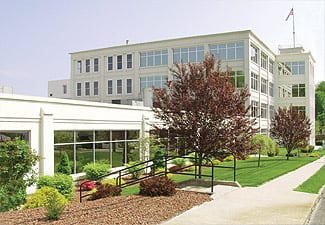PLASTIC INJECTION MOLDING
Sustainability
 Smith & Wesson Precision Components’ deep commitment to the environment is reflected in a number of initiatives, including energy efficiency and resource conservation in our Deep River plastic injection molding facility.
Smith & Wesson Precision Components’ deep commitment to the environment is reflected in a number of initiatives, including energy efficiency and resource conservation in our Deep River plastic injection molding facility.
Rather than a new facility on stripped land, our Deep River facility is located in a historic building that was restored to its original grandeur. The 10,000 square foot facility is illuminated with high-efficiency lighting that is controlled by motion sensors. A high-efficiency roof system adds insulation and reflects sunlight, thereby reducing the need for cooling in the summer.
On the plant floor, new high-efficiency, all-electric presses have been installed, substantially reducing power consumption. Preexisting hydraulic presses were retrofitted with Powerboss motor controls to further increase efficiency.
We participate in ISO New England’s Demand Response Program to help maintain the integrity of the regional power grid. Demand Response programs compensate large electricity users for reducing consumption during peak times that threaten to overwhelm the power grid. We are committed to significantly reducing usage as part of this program.
Renewable Energy
Our largest step toward energy efficiency was the installation of a solar photovoltaic system — 1,254 solar panels occupying 23,000 square feet of roof space. The system was designed by Gloria Spire Solar of Bedford, MA., with local support from long-standing partner Essex Commercial Construction. Our investment in renewable energy stems from a commitment to sustainable business practices as well as from the need to be competitive in the global marketplace.
The solar system will ultimately produce about 248,000 kilowatt hours per year — and avoid the generation of nearly 192 tons of carbon dioxide emissions every year.
Other Initiatives
Our Deep River facility is also committed to a major recycling effort. All cardboard that passes through the facility is recycled, as well as plastics used in the manufacturing process.
Other green initiatives being considered include:
Production paperwork is systematically being eliminated and replaced by tablet PCs and an electronic database. Two out of four production departments are already nearly paperless. All Quality Control documents are in the process of being scanned, with a goal to eliminate paperwork in that department. Manufacturing information is already being stored electronically, and production paperwork will soon follow.
Lean manufacturing techniques seek to eliminate waste in all forms. Our people are a major source of ideas for continued improvements in our company and our environment.
Smart HVAC equipment currently being tested includes software-based automatic controls, reversible exhaust/inlet fans, electrostatic air purifiers, and a host of internal and external sensors. The system improves shop air quality while reducing operating expenses by taking advantage of natural cooling and air recycling. The system may soon be adopted plant-wide.


